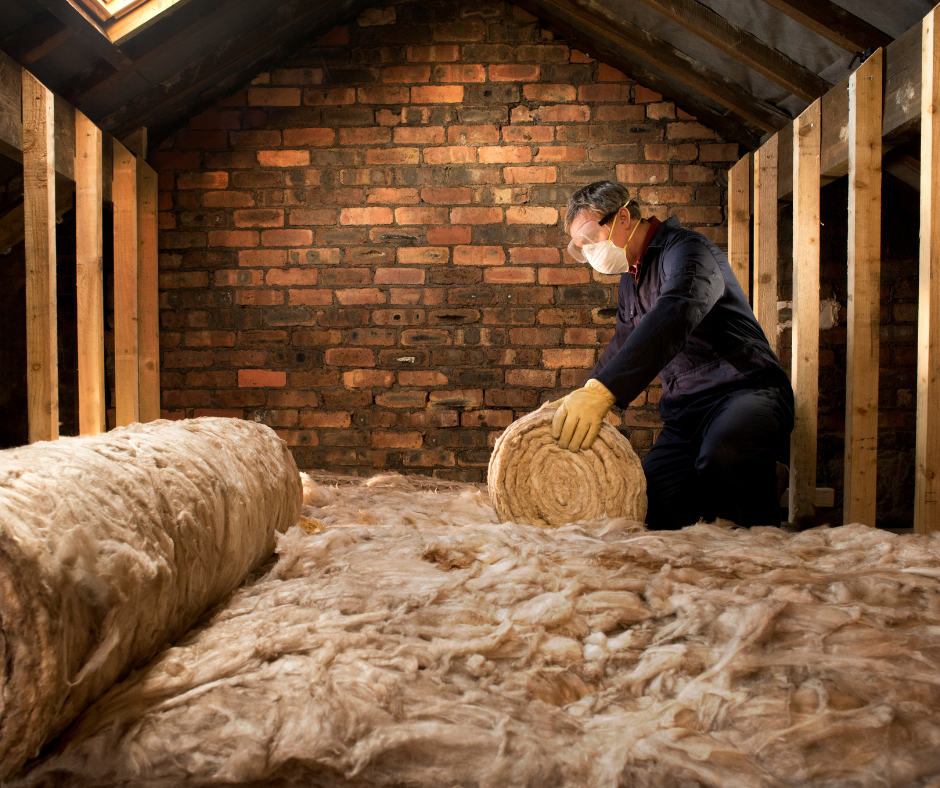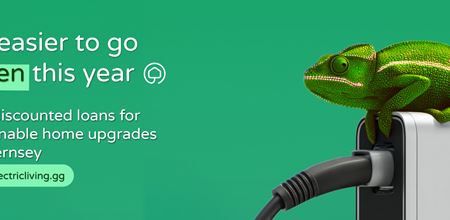What are the benefits of home insulation?
When potentially big savings and home comforts are at stake, we need a real person to tell us how it helps. Read on to find out how one house cut their consumption by 36%
After a few years working at Guernsey Electricity, our head of sales and solutions Kenrick Brooks now thinks it's normal to think about electricity on a daily basis. Not just at the office - as everybody uses electricity and we all pay the same rates, he also became concerned over just how much electricity he was wasting through his poorly insulated property.
We spoke to Kenrick about how he's managed to save himself a decent sum of money by insulating his home.
When you first bought your house, what was it like?
"We bought a single-block, detached four-bedroomed home with solid block walls (no cavity) and suspended timber floors over earth with air vents.
Despite the double glazing and the scraps of loft insulation, it turned out to be a cold and expensive place to live.

The property was heated using an electric 'HeatStore' boiler, which is designed to provide hot water and heating to traditional 'wet' radiators (which is heating run by a boiler and pipework) in every room. Then to keep the heating in check, there were thermostats controlling the ground floor and first floor heating zones."
In 2013/14, we used 26,500 kWh of electricity to heat our home and provide hot water in just one year. In short - that's a lot of energy.
What made you turn to insulation?
"I must confess, I didn't really understand the principles of heat loss and how insulating a property properly could massively reduce my energy usage - and my electricity bills.
But the black mould growing on my walls and the internal condensation was becoming a real concern, so I set about understanding the problem.
Since working alongside the heating sales team at Guernsey Electricity, I learned about something critical every homeowner should know about if they're keen to help cut both cost and carbon emissions.
Heat loss measures the total transfer of heat through the 'fabric' of a building from inside to outside, either from conduction, convection, radiation, or any combination of the three. Usually stated in kilowatts (kW), heat loss calculations tell you how much energy you need to keep a room/property at a given temperature on the coldest day of the year.
When we discovered our heat loss was shockingly high, we needed to find out why.
Insulation
This is when I learned all about insulation. It's something I'd heard of, but never something I could translate into hard cash.
What's the point in spending money insulating my home when there are other things to think about?
When we were advised to consider insulation, we chose to do it room-by-room, as we planned to renovate the property one room at a time. If you've got enough sway in your budget, you can insulate your property from the outside by wrapping it in external insulation. This is the very best option as it stops any potential for 'thermal bridging' - but it is a big capital to outlay all in one go."
Take us through your insulation journey
"When you have a heat loss calculation on your home, you'll get a 'total heat loss' figure measured in kW, and different parts of your property will all contribute to this final figure.
Roof

We increased the amount of loft insulation in our roof space from 50mm to 150mm.
All rooms have 50mm 'Thermoboard' with integral vapor barrier installed, and originally we installed the boards onto pressure treated timber batons with damp-proof membrane behind it.
Walls

In our more recently renovated rooms, we installed boards on a galvanised metal track and channel system, which in essence creates a cavity wall.
Floors

We took out our ground floors and installed 50mm of ridged insulation between the joists, laying a vapor barrier and installing new sub floors.
What about damp?
The number one, non-negotiable piece of advice about insulation is to always consider its impact on damp.
"Getting vapour barriers installed correctly is perhaps the most important thing to do, otherwise condensation will build up in the wrong places, which can lead to damp and rot in your property. So do make sure you seek professional advice if you're planning to do some of the work yourself, as we did."
What did you save?
"After spending some time with the calculator, I must admit I was blown away with just how much I'd saved by getting my property insulated."
Energy
"In 2023/24, we were using 19,500 kWh of electricity over the year to heat our home and water. Before insulation, we were using 26,500kWh, meaning insulation translated into a massive 25% reduction in our energy use.
Before insulation, we were paying for 7,000 kWh of energy each year that we gained no benefit from
Carbon
"We reduced our carbon emissions by almost a tonne each year (0.7 metric tonnes).
I worked this out using the lifecycle carbon intensity figures of distributed electricity in Guernsey, which as of 31 December 2023 stood at 100g of carbon per kWh."
Black mould
"Perhaps the most immediate benefit is the resident black mould is now a thing of the past, and our home stays warm and cosy.
We've still got one more room to insulate, which we plan to do soon so we can make more savings on our electricity consumption."
How do you heat your home?
"I grew up in the 60's and 70's, and as far as I was concerned there was on way to heat a home through central heating - a traditional [flow] boiler fueled by oil, gas or electricity.
Flow boilers heat water, then pump it around the property's pipework to radiators throughout the house. Anything other than this I assumed was just not as good.
When we bought our house, at the time it was heated using a HeatStore boiler coupled with water fed traditional radiators.
Confession time - after spending most of the last few years thinking about heating on a [work] daily basis, I've had a complete change of heart on what exactly a good heating system might be.
If sized correctly based on the property's heat loss, all heating systems should perform well if they're installed and commissioned properly.
As we were insulating and refurbishing our home room by room, once we'd decided to move to electric rads, we planned individual cable installs as part of the upgrade process. Luckily for us, we already had the separate 'Superheat' meter installed as we were moving from a different electric system, but we will had to apply to GEL for additional load before we went ahead with the installation.


So why did I decide to switch my electric 'wet' HeatStore heating system to a 'dry' 'Rointe' D Series and 'Palaos' electric radiators', coupled with separate hot water cylinder?
- The electric rad in every room can be individually controlled, switched on and off, and set at different precise temperatures. Unlike relying on one single boiler, if one radiator fails, the others will still keep the majority of the property heated
- There's less potential for water leaks as there's no water or pipework involved. Sorry plumbers, you're out of a job..
- Our chosen electric rads have built-in energy saving measures, as required under the Ecodesign for Sustainable Products Regulation.
- Our HeatStore in the garage was 'leaking' some heat, which I'd rather not have to pay for
Plus, I think the rads we chose look really smart."
Thinking about moving to electric heating? Please read this important information first
Important: What you need to know first
The panel radiator numbers
 |
 |
So what did I gain by moving to electric panel radiators?
"The combination of home insulation and switching from a 'wet' electric boiler to 'dry' electric radiators reduced our energy consumption by a staggering 36% (or 9500 kWh per year). Based on July 2025 tariffs, I'll be saving at least £1,256 each future year when I'm using just 15,000 kWh of electricity to heat my home.
Switching to 'dry' electric panel rads from a flow boiler reduced our energy consumption by a further 13% compared to my energy bill last year."
What is the 'additional load' process?
We only have a finite amount of cable infrastructure to supply islanders with power. This means if you're planning a major installation such as electric heating, electric vehicle charger or something like a hot tub, we'll need to check if there is enough capacity on your surrounding network.
Please be aware that depending on the network in your area, you application for extra power may be declined, or you may need a new cable to connect your property to the network.
A supply cable upgrade can take up to six months if a road closure is needed. Plus some roads may have a digging embargo for up to three years if they have been recently resurfaced.
If you're planning to move to electric heating, it's best to start this process at least a year ahead of your planned installation - and please never wait until your existing system is about to break down.
How does your system cut your carbon emissions?

"I've cut Guernsey's carbon emissions by almost 1 tonne a year.
My hot water cylinder was installed/wired separately from my Superheat meter and instead, it was connected to my Super Economy 12 meter. That means my water is heated overnight between 11pm and 5am using my Super Economy 12 cheap rate. Again, since working at Guernsey Electricity, I discovered that the cleanest and cheapest time to heat your water and run electricals where possible is between 11pm and 5am
This is because for 90% of the year, we can rely on low-carbon imported energy from the European grid through a subsea cable. When during winter when it's dark, cold and raining, we need to use fossil-fuels at the power station to top up this imported electricity.
Except between 11pm and 5am; as most people are asleep and businesses closed, this is when we can rely 100% on the low-carbon imported electricity. That's why it's important to run what we can - particularly hot water cylinders - between these times.
We used to top up hot water that we used on our HeatStore on the "Superheat" Tariff. But in 2024/25, over 12-months we used 2,000 kWh of electricity to heat our water overnight on the "Super Economy 12" tariff (which is slightly cheaper too)
If in future Guernsey Electricity charge for electricity connections based on maximum demand, then having individual panel rads and a separate hot water cylinder will mean you benefit from 'operational diversity' - i.e. each heater will individually switch on and off at different times, which means the amount we demand at any one time will be lower as it's spread across different electrical units."










